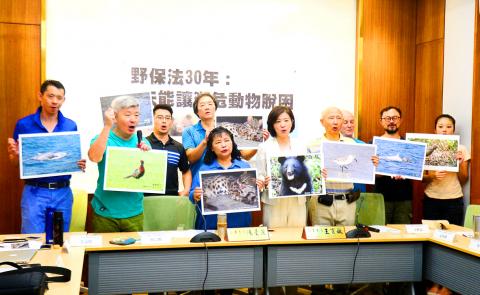Animal protection groups yesterday called on the Legislative Yuan to amend the Wildlife Conservation Act (野生動物保育法) or draft a separate law that would provide a clear legal basis for restoration efforts for critically endangered animals.
Government funding for conservation has been cut every year since the act was promulgated three decades ago, the groups said.
“The government has adopted a concerned, but passive attitude toward the conservation of endangered animals, instead of furthering attempts to restore the populations,” the groups said.

Photo: Wang Yi-sung, Taipei Times
The government conducts censuses and surveys of animal populations, but that is not enough, said Pei Chia-chi (裴家騏), director of the Institute of Wildlife Conservation at National Pingtung University of Science and Technology.
Survey results show that endangered animal populations are decreasing, and some have become extinct, Pei said.
For example, the Taiwanese clouded leopard was declared extinct in 2015, Pei said, adding that rumors of clouded leopard sightings last year have yet to be proven.
Legislative action is needed to give animal restoration efforts a legal basis and endangered species a chance at recovering, Pei added.
The nation should not focus on research and surveys while dismissing the importance of restoration, Chinese Nationalist Party (KMT) Legislator Alicia Wang (王育敏) said, adding that amendments should be introduced to specify goals, estimated times of completion and budgets.
Wang and Democratic Progressive Party Legislator Chen Man-li (陳曼麗) called on the government to set aside political differences and work together to push for the amendment.
Taiwan Animal Protection Monitor Network chairman Wang Wei-chih (王唯治) said that the amendment should introduce clauses to strengthen endangered animal conservation efforts.
Amendments are necessary, as the current level of funding has failed to prevent the decline of the Indo-Pacific humpback dolphin population, which fell from 100 in 2002 to 50 in recent surveys, Wild at Heart Legal Defense Association founder Robin Winkler said.
Animal conservation should not only focus on monitoring administrative agencies or the Forestry Bureau, but should also monitor the Ministry of Transportation and Communications, the Ministry of the Interior and the Ministry of Economic Affairs, which oversee land development, Winkler said.
Chinese Wild Bird Federation secretary-general Lee Yi-hsin (李益鑫) said that the amendment should prioritize animal conservation when considering development around or on natural habitats.
Development efforts should be halted immediately if endangered species are present, Lee added.
Forestry Bureau Conservation Division Director Hsia Jung-sheng (夏榮生) said that the government would take the suggestions into consideration when making policies, while thanking the groups for their help.

Alain Robert, known as the "French Spider-Man," praised Alex Honnold as exceptionally well-prepared after the US climber completed a free solo ascent of Taipei 101 yesterday. Robert said Honnold's ascent of the 508m-tall skyscraper in just more than one-and-a-half hours without using safety ropes or equipment was a remarkable achievement. "This is my life," he said in an interview conducted in French, adding that he liked the feeling of being "on the edge of danger." The 63-year-old Frenchman climbed Taipei 101 using ropes in December 2004, taking about four hours to reach the top. On a one-to-10 scale of difficulty, Robert said Taipei 101

Nipah virus infection is to be officially listed as a category 5 notifiable infectious disease in Taiwan in March, while clinical treatment guidelines are being formulated, the Centers for Disease Control (CDC) said yesterday. With Nipah infections being reported in other countries and considering its relatively high fatality rate, the centers on Jan. 16 announced that it would be listed as a notifiable infectious disease to bolster the nation’s systematic early warning system and increase public awareness, the CDC said. Bangladesh reported four fatal cases last year in separate districts, with three linked to raw date palm sap consumption, CDC Epidemic Intelligence

Two Taiwanese prosecutors were questioned by Chinese security personnel at their hotel during a trip to China’s Henan Province this month, the Mainland Affairs Council (MAC) said yesterday. The officers had personal information on the prosecutors, including “when they were assigned to their posts, their work locations and job titles,” MAC Deputy Minister and spokesman Liang Wen-chieh (梁文傑) said. On top of asking about their agencies and positions, the officers also questioned the prosecutors about the Cross-Strait Joint Crime-Fighting and Judicial Mutual Assistance Agreement, a pact that serves as the framework for Taiwan-China cooperation on combating crime and providing judicial assistance, Liang

US climber Alex Honnold left Taiwan this morning a day after completing a free-solo ascent of Taipei 101, a feat that drew cheers from onlookers and gained widespread international attention. Honnold yesterday scaled the 101-story skyscraper without a rope or safety harness. The climb — the highest urban free-solo ascent ever attempted — took just more than 90 minutes and was streamed live on Netflix. It was covered by major international news outlets including CNN, the New York Times, the Guardian and the Wall Street Journal. As Honnold prepared to leave Taiwan today, he attracted a crowd when he and his wife, Sanni,